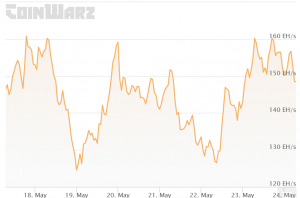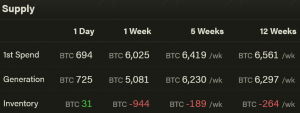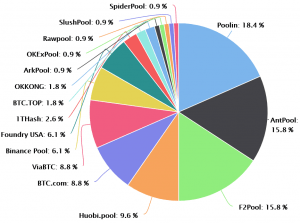Analysts See ‘Seismic shift’ In Bitcoin Mining Amid Chinese ‘Crackdown’
Bitcoin (BTC) could be in for a fresh battering this week after reports emerged that some mining pool players including HashCow and BTC.TOP, are reviewing their operations in China as a response to central government pressure on the mining sector, while some industry observers argue that this might mean “redistribution of the entire Bitcoin mining network.”

Per Reuters, HashCow has stated that it will “stop buying new bitcoin rigs,” while BTC.TOP has “announced the suspension of its China business citing regulatory risks.”
The Chinese crypto exchange Huobi has also suspended its crypto mining services – as well as its crypto derivative “trading services” – to mainland Chinese clients, “adding it will instead focus on overseas businesses.”
“In order to be more focused on the expansion of our overseas presence, we will currently suspend the provision of related services for new users in mainland China,” the company said, adding that “most users will be unaffected by this change.”
Late last week, Cryptonews.com reported that one Chinese exchange was closing its doors after fresh regulatory rumblings from Beijing.
Also as reported, the Chinese government posted a warning on its website from the regulatory Financial Stability and Development Committee and members of the Central Committee of the Communist Party of China – Beijing’s top decision-making body.
The regulator promised to “crack down on bitcoin mining and trading activities,” as well as “prevent and control financial risks.” The statement’s authors also vowed to “punish illegal financial activities” and promised a “heavy crackdown on illegal securities-related activities.”
China has had the crypto mining industry in its crosshairs for some time. Earlier this year, there were clear signs that the Inner Mongolia Autonomous Region (IMAR) and the Xinjiang Uygur Autonomous Region (XUAR) – two hotbeds of mining activity – were coming under pressure from Beijing to meet key carbon emissions targets. The regions have been looking to respond by shutting miners who cannot switch to renewable power to shut down.
China has pledged that it will reach carbon neutrality by 2060, but many of the nation’s crypto miners have set up shop in the IMAR and XUAR, where they often make use of the output of highly polluting, older coal-powered stations.
Reuters quoted the BTC.TOP founder as writing, on Weibo:
“Eventually, China will lose crypto computing power to foreign markets.”
However, on Twitter, some disputed the veracity of the reports, with one claiming that BTC.TOP was “no longer servicing Chinese customers” per its announcement, rather than closing down its mainland activities. Cryptonews.com has reached out to BTC.TOP for comment.
Meanwhile, Jiang Zhuoer, CEO of BTC.TOP, tweeted that “large datacenter and major veteran miners may suffer a significant loss this time, while the whole Bitcoin network will be as resilient as always.”
“The worst scenario would be: large datacenters are shut down and we go back to old days in 2014-15,” he added.
Mustafa Yilham, the Vice President of global business development at Bixin, wrote that it was significant that “this is the first time such a high-ranking member of the PRC” had declared a “crackdown,” adding:
“Usually, that means there will be some enforcement actions in the coming weeks. No one knows the level of enforcement action that will be taken at the moment. Uncertainty is creating bearish sentiment among Chinese miners.”
Bitcoin hashrate in the past week:

According to him, some miners have already “panic sold” BTC and “others had no choice.”
“Not everyone [has] access to western hosting sites. There [is] also added level of uncertainty on current RMB [over-the-counter] trading channels. Need fiat to cover operational costs at end of the day,” Yilham said.
Meanwhile, Nic Carter, the Founding Partner of crypto-focused venture capital firm Castle Island Ventures, wrote:
“I’ve effectively been able to confirm […] (unusually high) miner selling leading this last leg down. […] Miner selling is a huge driver of price action here.”
BTC generation and sales:

Carter added that there could be a silver lining to a mass Chinese exodus from the mining sector in the form of cleaner power.
He wrote:
“Everything I’m seeing indicates an absolutely seismic shift of hashpower out of China and into the world at large. It won’t be elegant or pretty but obviously, it’s great for hashrate distribution and likely carbon intensity.”
On a weekly chart, BTC.TOP had a 2.5% share among Bitcoin mining pools, while, in the past 24 hours, it dropped to 1.8%. OKExpool, Slushpool, Binance Pool have also decreased their share, while Foundry USA, AntPool, Poolin, and Huobi.pool have strenghtend their positions.
BTC hashrate distribution among mining pools in the past 24 hours:

In a video, Carter also opined that “it does look like Chinese miners are aggressively scouting out alternative domiciles overseas.”
He added that miners are looking at in Central Asia, Europe or the United States in a bid to continue functioning – although there was evidence of “miner selling,” with a possible bid to “hedge into fiat” in some cases.
At 08:13 UTC, BTC trades at USD 36,673 and is up by 3% in a day, trimming its weekly losses to 21%.
___
Learn more:
– Moving to Green Bitcoin May be Moving To a Two-Tier Bitcoin
– Green Investments Help Bitcoin Miners Amid Possible Regulatory Crackdown
– Bitcoin Mining Difficulty Hits an ATH As Miners Send Bullish Signs
– Proof-Of-Bitcoin Needed As Critics & Competitors Unite To Play Climate Card
– A Closer Look at the Environmental Impact of Bitcoin Mining
___
(Updated at 09:46 UTC with a tweet by Hasu. Updated at 10:06 UTC with additional comments.)




